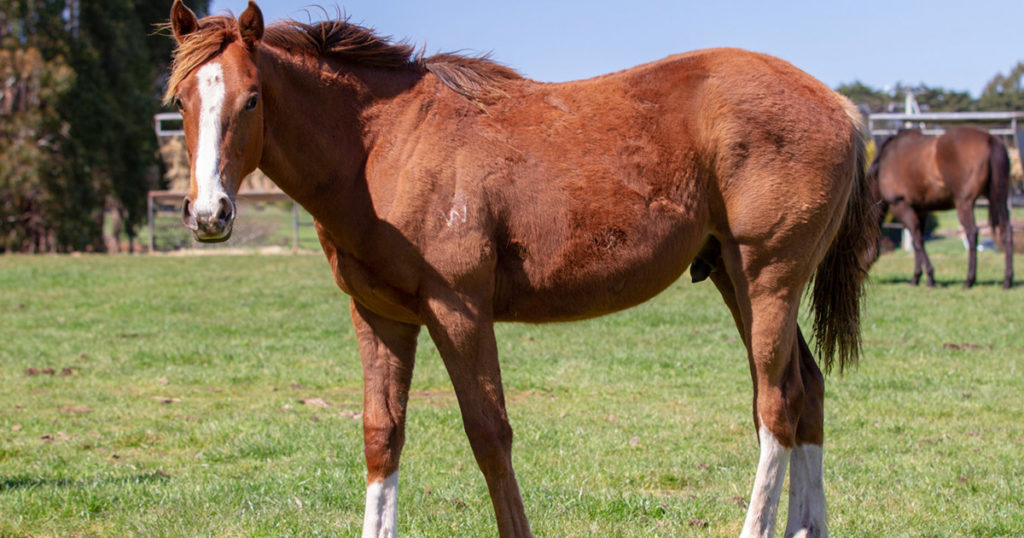When thinking about nutrition for hoof health, biotin gets a lot of attention. Supplemented in appropriate amounts, biotin may help to improve hoof wall integrity. Conflicting evidence exists as to whether or not supplemental biotin improves hoof growth rate.
But there’s so much more to hoof health than biotin, and if we just focus on one nutrient we miss an important opportunity to help improve not only our horse’s hoof health but their overall health.
It’s also worth remembering that horses with a healthy hindgut microbial population are able to synthesise their own biotin.
Gastrointestinal (GI) health
Poor hoof health can often be indicative of poor gastrointestinal health and/or nutrient deficiencies and/or inadequacies in their diet.
Good gastrointestinal (GI) health in our horses is central to their overall health. The integrity of the cells lining the GI tract, the types and numbers of specific microbes which inhabit the digestive tract and the production of special enzymes within the GI tract all play key roles in many facets of their health.
Long-stem fibre should form the foundation of our horses’ and ponies’ diet: yet fibre intake in many equines falls well below the minimum recommended requirements. Fibre passes through a horse’s stomach and small intestine undigested, where it reaches the large intestine. Here it undergoes bacterial fermentation by special types of microbes (note: it is normal and healthy for horses to digest fibre in their hindgut, it is not healthy for them to ferment undigested grains and starches). The fermentation of fibre by these microbes results in the production of various substrates important for immune, gastric and nervous system health in our horses. Some of these healthy microbes also produce biotin. A horse with a healthy hindgut microbial population who is fed adequate fibre, can synthesise good levels of biotin needed for hoof health. To read more about the importance of fibre in our horses’ diets, see: Grass, Hay, Fibre and Short Chain Fatty Acids.
Many other nutrients are required for healthy hooves: sufficient quality protein (including adequate amounts of the amino acids lysine, methionine and choline read more about the importance of protein here); copper; zinc; iodine; calcium; selenium; B group vitamins; vitamin E; vitamin C and vitamin D. Some of these need to be provided in a horse’s diet. Others such as B group vitamins, vitamin C and vitamin D a horse can synthesise if given the right conditions. Simply supplementing biotin alone without ensuring other nutrient needs are met is of limited value. All the aforementioned nutrients also play various key roles in other facets of our horses’ and ponies’ health: fertility; metabolism; immune health; joint and musculoskeletal health; neurological function and behaviour.
Anything that interferes with a healthy GI microflora population in our equines, and/or interferes with the integrity of the cells lining the GI tract, in turn influences nutrient absorption and/or metabolism. Ironically, some of the things which interfere with digestive function are often used to help counteract digestive or other health complaints: gastric ulcer medications; antibiotics, non-steroidal anti-inflammatory drugs and corticosteroids to name a few. To learn more about the influence of ulcer medications in relation to the overall health of our horses, visit: Ulcers in Horses: The importance of understanding how medications work.
It’s worth considering the aforementioned aspects before trying to solve an issue such as poor hoof health by adding more supplements to a horse’s diet. If a horse or pony isn’t consuming sufficient fibre or nutrients, and/or is unable to properly digest, absorb or utilise specific nutrients, then adding more supplements to their diet is unlikely to provide an effective solution to the issue at hand.

Camilla Whishaw is a highly regarded, experienced horsewoman and naturopath, helping to holistically treat and manage a broad range of equine health conditions and injuries, with a passion for mare and stallion fertility.
As a world-renowned practitioner, presenter, author, and consultant in the field of Equine Naturopathy, Camilla shares her knowledge through keynote presentations, interviews, lectures, panel sessions, and workshop training.





